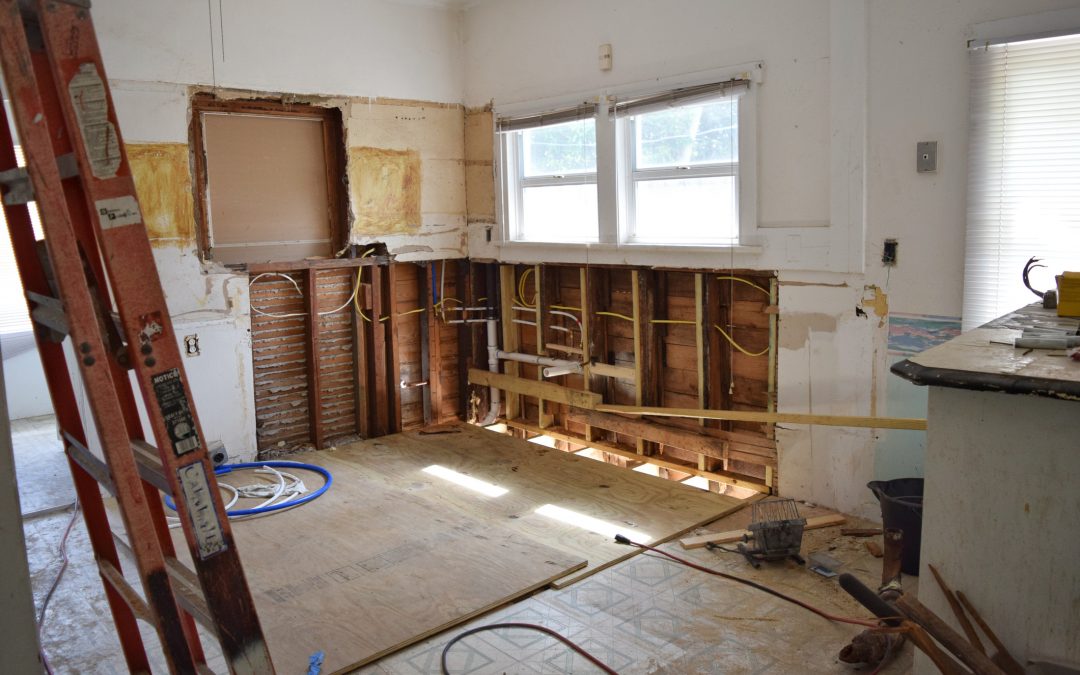
by admincoasta | Aug 3, 2022 | Uncategorized
For seasoned residential real estate investors, you probably have experience handling a wide range of new-build initiatives, whether its single-family houses or multi-family developments. However, successfully transitioning from blueprints to fully completed residences entails meticulous planning, considerable time, and—perhaps most importantly—reliable financing.
The good news is that there is a plethora of loan products for you to access the capital you need to complete your next construction project. One great option is using a new construction loan. The lending experts at Coastal Capital Funding have been assisting successful real estate investors for years obtain the financial resources they need to achieve their goals and have leveraged that experience to provide you with the following overview of the major benefits of new construction loans and how you go about obtaining this specifically structured funding.
Construction Loan Basics
To assist you in starting your next construction project off on the right foot, you can opt for a new construction loan to pay for project expenses prior to transitioning to a more long-term form of funding like a conventional mortgage. New construction loans are intended to provide a streamlined capital solution for developers planning to build new homes from the ground up. While it is somewhat similar to your standard mortgage, a new construction loan is distinct due to its efficient underwriting timeline, compressed duration and periodic disbursal schedule at clearly distinguishable project milestones as opposed to one lump sum disbursement.
These short-term funding plans usually only extend for approximately one year instead of continuing for the multiple years conventional mortgages typically do. Based on the particular construction plan, the new construction loan can be used to cover the acquisition of the land, obtaining any necessary licenses, paying fees, or acquiring materials, workers and contractors. Because new construction projects are often on a strict deadline, investors should be prepared to provide their chosen lender with a detailed overview of their proposed development during the underwriting process—including key metrics such as overall operating budget, anticipated timeline and architectural schematics.
Advantages of a New Construction Loan
- Accessibility & Speed: Private lenders like Coastal Capital Funding offer a streamlined underwriting process, allowing them to evaluate, approve and disburse funds in a fraction of the time it takes conventional banks to do so. And because hard money lenders have greater flexibility when it comes to the individuals they lend to, they are able to work with investors who may not have a stellar credit score or verifiable income but still have a viable construction project with tons of potential upside.
- Cost-Effective Funding Alternative: Although conventional financing options and personal loans may carry reduced interest rates, those loan installment plans usually last for multiple decades—meaning you end up paying a ridiculous amount in the form of interest over the lifetime of the loan. Compare that with a new construction loan, where the entire balance will be completely paid off in around a year, with most plans requiring you to only pay interest on funds drawn to date until the project is done. When you crunch those numbers, it is readily apparent that new construction loans can save you a ton thanks to their relatively short duration.
Private Real Estate Lending Made Easy
Coastal Capital Funding is a Direct Private Lender, funding a variety of real estate projects throughout Virginia, North Carolina and Nationwide.CCF offers quick, efficient common-sense funding solutions when traditional lending institutions fall short in terms of speed, underwriting and out of the box thinking.The CCF team brings thirty years of experience in the real estate industry. Our market knowledge and experience has us uniquely positioned to be your private lender of choice. We understand the needs and wants of our clients and we are hands-on with you every step of the way. We approach each deal as if it were our own- by identifying capital requirements and providing the correct funding solution. Get in touch with us today to learn more about how we can assist you in achieving all of your investment goals.

by admincoasta | Apr 29, 2022 | Uncategorized
The more advanced technology has become, the more it has altered the real estate investment landscape—enabling investors to accomplish a wide range of investment-related task right from their phone. Just as importantly, technology has enhanced our networking and sharing capabilities significantly, allowing investors to effortlessly connect with fellow real estate professionals to locate, purchase and fund new deals. Breaking into the real estate investment sector is literally only a few clicks away.
Finding the Ideal Investment Asset
Selecting the right investment property that is aligned with your long-term investment strategy is an essential step for successful real estate investors. Digital real estate platforms like Zillow have made it easier than ever to obtain pertinent data for properties across the country so you can assess key metrics like potential ROI, listing price and neighborhood information. Additionally, the site also allows investors to market their properties to viable tenants or buyers—all from the convenience of their computer or cell phone. Having all the information you need almost instantaneously provides investors with a notable advantage in today’s ultra-competitive market, allowing them to make informed buying and selling decisions with minimal delay. Investors may also consider mobile applications like Connected Investors, which aggregates fellow real estate professionals and potential deals that may not appear in regional MLS listings.
Acquiring Investment Properties
Gone are the days of mountains of paperwork and endless signature lines associated with closing a property transaction. Innovative and super convenient mobile applications such as DocuSign eliminates the need for paper altogether and allows for the digital processing of real estate documents. All involved parties can quickly and easily review and sign off on contracts, lease agreements, disclosure and bank documents. The app offers state-of-the art encryption and security features to ensure all data is protected and stored safely.
Another great technological advancement is DealMachine, an online platform that allows investors to digitally search properties and directly reach out to the owners by email or phone. Often it is the most basic tasks that hold up a potentially lucrative deal from moving forward, and this application takes care of one of the most imposing hurdles investors run into: soliciting homeowners and letting them know they are interested in acquiring their properties.
Evaluating Potential Investment Deals
For investors exclusively searching for viable fix-and-flip deals, the PropertyFixer app is an extremely useful tool that makes it easy to forecast renovation budget and providing key insights regarding expense breakdowns (i.e., taxes, insurance, permits, etc.). Investors now have the ability to quickly tap into an accurate analysis of the costs associated with potential fix-and-flip deals so they can calculate hypothetical return on investment and ultimately decide whether or not to commit to a deal.
A comparable application for the rental market is DealCheck, which offers an even more in-depth data analysis for listed properties. This free and user-friendly platform provides a thorough break down of projected costs, expected net profitability and more while offering real-time MLS updates and up-to-date property images.
Get Started Today
The stark reality is that technology is increasingly becoming an integral component of the real estate investing marketplace. Real estate investors should leverage the numerous benefits offered by digital innovations to optimize their workflow and enhance their profitability. Embracing proven technologies and having the willingness to proactively explore emerging ones is a great mindset to have that will keep you relevant and competitive in an industry that is constantly evolving.
The perfect complement to a thorough understanding of available investment technologies is a trusted lender that can provide you reliable and efficient access to the capital you need to close deals. That’s exactly what you can expect when you partner with Coastal Capital Funding, a direct private lender with over three decades of experience assisting successful investors throughout Virginia, North Carolina and across the country. CCF provides quick, efficient, common-sense funding solutions that conventional lenders simply cannot content with. Contact us today to learn more about our comprehensive range of funding solutions!

by admincoasta | Mar 21, 2022 | Uncategorized
All signs point to the current housing boom taking place not only in Virginia but the entire country continuing for the foreseeable future. The Commonwealth State experienced an impressive 54% uptick in transactional activity in the past year alone. Now is a fantastic time for savvy investors to capitalize on the favorable market dynamics and lock in assets that will produce consistent returns on investment for years to come. The experts at Coastal Capital Funding crunched the numbers to highlight some of the best areas to kick off your investment property hunt in the Hampton Roads and Northern Virginia markets.
Northern Virginia
Despite the ongoing COVID-19 situation, the Falls Church area recorded an exponential increase in property sales of 127.3% from June 2020 to June 2021. Surrounding areas experienced similar levels of activity, with Fairfax County reporting a 48.8% spike in home sales during the same period. The number of home sales isn’t the only data point that is trending upwards in the Northern Virginia market—the average home sale price has also risen significantly. The median selling price in the area has jumped 14% from 2021 to $741,574. Fairfax City homes are currently selling for more than 13% than last year, with the average price currently sitting around $615,000. Comparable increases have also taken place in Arlington and Alexandria, where median home prices have risen to $820,150 and $701,302 respectively. Homes are not staying on the market for long either—which is great news for real estate investors as this indicates demand is high for housing options. Prospective homebuyers are willing to pay premium prices for the right fit, meaning there is little concern from an investor’s point of view when it comes to potential vacancy issues.
Here’s a closer look at some of the best Northern Virginia Markets to invest in:
- Fairfax: This suburban community was the first county in the entire country to hit a six-figure average household income. Fairfax offers an abundance of amenities including public parks, museums and dining options and also boasts one the most highly-ratedschool systems in the entire country. The median home price is $544,700 and is projected to increase an additional 3.1% in the coming year. The average monthly rate is currently $1,826 with the median household income reported at $115,717.
- Alexandria: It should come as no surprise why Alexandria tops our list as one of the best NOVA markets to consider for a real estate investment property. Perfectly situated just 10 miles from Washington, D.C., scores of workers flock to this waterfront community drawn by the quick commute to work and the numerous restaurants, shops and parks. Landlords will have no problem finding quality tenants for rental properties and the area’s strong economic performance ensures optimal return on investment.
Hampton Roads
Some of the key metrics to consider when looking for a market to acquire an investment property in are quality of life, housing prices and employment. Hampton Roads excels in each of these metrics. The region encompasses a wide variety of property types and neighborhoods that offer potential investors an abundance of options. Hampton Roads refers to seven individual cities located throughout Coastal Virginia: Chesapeake, Suffolk, Newport News, Hampton, Portsmouth, Norfolk and Virginia Beach. All of these are solid investment options due to the following unique characteristics:
- Economic Stability: Nearly one-third of the Hampton Road’s economic activity is related to the defense industry. There is a robust military presence in the area and the surrounding economy receives a constant influx of workers, money, and business thanks to its close ties with the industry. Additionally, the tourist sector is thriving thanks to the area’s location on the coast. Vacation rental properties are an excellent option that can produce above-market returns in the Hampton Roads area.
- Ongoing Development: All seven cities comprising the Hampton Roads area are expected to continue to grow in population at a rate well above the national average over the course of the next five years. The steady influx of new residents means there will be a reliable demand for viable housing options for the foreseeable future—a great market trend for investors.
- Amenities: There are a number of educational, recreational and cultural amenities that draw people to the Hampton Roads area. Home to several institutions of higher education such as Old Dominion University and Hampton University, the region has a strong student population that makes multi-family rentals a smart investment option in the area. Furthermore, attractions like the Norfolk Botanical Gardens, Virginia Aquarium and Museum of Contemporary Art draw countless visitors every year—meaning a correctly marketed vacation rental could be a lucrative investment in the area.
A Trusted Lending Partner
The market is primed for successful real estate investments—let the Coastal Capital Funding team use its experience, market knowledge and client-centered approach to lending to assist you in accomplishing all ofyour investment goals! We specialize in delivering individually tailored funding solutions in a fraction of the time it takes traditional banks. Our streamlined underwriting process and flexible terms give our clients a distinct edge in today’s competitive market. Contact us today to learn more!

by admincoasta | Jan 25, 2022 | Uncategorized
Choosing the right investment market in Virginia is the secret behind generating sustainable passive cash flow. Regardless of whether you are seeking low entry costs, optimal monthly rent prices or the long-term appreciation potential, here is a closer look at some of the best performing Virginia real estate markets for fix-and-flip projects.
Richmond
With a large millennial population base accounting for over a third of the nearly one-million strong population, Richmond is prime real estate for a fix-and-flip investment property. As millennials start to hit ideal homebuying age, there is an increased demand for properties in the Richmond area as only 1.3% of institutional investors acquired property this year—meaning property prices are still affordable and offer great yields. Richmond and the surrounding areasare jam-packed with a variety of amenities from the Virginia Museum of Fine Arts to a vibrant culinary scene. The median sales price remains an affordable $235,000, which translates into a low barrier of entry for aspiring real estate investors. Property is appreciation at a healthy 2% per year in Richmond, which bodes well for long-term profitability.
Virginia Beach
The allure of fun in the sun is sure to draw viable buyers for a recently flipped property. Virginia Beach is the largest city in the entire state with a population of 425,000 residents and is constantly ranked as one of the most family-friendly areas. Population and employment growth are steadily rising as well. The city boasts a bustling town center, a vibrant social scene, and many outstanding restaurants—all of which will help investors in selling their rehabbed properties at a premium price point. With three and a half military bases, agriculture and tourism all supporting the booming local economy, meaning that potential homeowners will have the buying power and confidence to snap up promising real estate.
Lynchburg
Also referred to by locals as the “City of Seven Hills,” Lynchburg boasts a rich and storied history that shaped its currently thriving culture. While its historical architecture, lively downtown area and outdoor recreation draw crowds from all over, the city is also home to some of the best public-school systems Virginia has to offer. That is prompting a notable rise in the population as homebuyers with children flock to the area. On top of all that, Lynchburg is also host of five colleges. The average home sales price is a very affordable $153,000—which has risen by 7.2% in the last year alone. Real estate investors should get involved in this up-and-coming market soon while the prices are still favorable.
Norfolk
If you are a fan of laid-back living on the water, then Norfolk is the place for you. Homeowners can enjoy sailing, watersports, and scenic views everywhere they look, making it easy for real estate investors to quickly resell renovated properties. With a bustling main street and playing host to NATO headquarters and the Atlantic Fleet of the Navy, the largest naval base in the world,Norfolk and the region have a very strong economy and a healthy job growth rate. More and more employees and military personnel will be moving to the area in the coming years, and they will all need a place to live. What’s more, Norfolk is also the location of Old Dominion University and Norfolk State University, which is great news for property fix-and-flip projects as students and faculty are always on the hunt for flexible and affordable housing options.
Roanoke
Roanoke is one of the top-performing markets in Southwest Virginia and has a property to fit any investment approach—from commercial spaces to multi-family complexes. It is the region’s economic and social hub, meaning there is excellent employment opportunities that has led to an ever-increasing number of incoming young professionals all looking for a place to live. With a growing population of over 315,000 residents, landlords should have no concerns with finding viable tenants. Home to Roanoke College and within driving distance to a number of other higher education options, rental properties catering to students and millennials will perform well indefinitely in this quaint, historic city.
Get Started Today
When it comes to funding, having the right lending partner can make all the difference—especially when investing in what can oftentimes be a complex and nuanced real estate sector like fix-and-flip properties. The experts at Coastal Capital Funding have years of experience providing efficient and innovative construction funding solutions. We are intimately aware of the unique challenges and concerns real estate investors must navigate in this exciting asset class. Contact us today to learn more about how we can help you reach your investment goals.

by admincoasta | Dec 10, 2021 | Uncategorized
All sectors of the modern real estate sector are evolving at breakneck speed. Although a considerable number of real estate investors have successfully leveraged the notable uptick in price increases to record historic profits, the current market still presents a wide range of uncontrollable variables that make for a dynamic environment in which to conduct business.
The good news is that talented professionals across all sectors of the real estate industry—from lenders to key stakeholders—are actively developing creative solutions to the growing number of challenges that investors face in the rapidly changing real estate market.
Supply Chain Delays
The ongoing COVID-19 situation has created backlogs in several key global supply chains—making it harder and costlier to attain needed construction materials for development purposes. There is presently an overwhelming demand for newly-built residential homes which is fueling price increases and making home ownership untenable for many a would-be homebuyer. Investors should focus on creating and maintaining close working relationships with sponsors and lenders to ensure accurate budget forecasting and that projects stay on track to reduce overall expenses.
Inventory Shortfalls
Another culprit behind the price creep across the country is the widespread inventory shortage. Due to historically low interest rates, the national real estate market still holds a considerable amount of appeal for both foreign and domestic investment entities. This has led to a significant increase in the number of institutional investors becoming active players in the residential real estate space—particularly in the single family rental class. The resultant bidding wars for the limited number of viable investment properties has driven up property values but has simultaneously put notable pressure on investors and private lenders to adapt. Fortunately, with the expiration of both the federal eviction and foreclosure moratoriums, the inventory situation should begin to improve in the near future.
Limited Appraisers
For a large segment of the real estate investor community, it has been challenging to find a qualified appraiser—a necessary component of any transaction—due to the uptick in delays. Although delays in the appraisal completion fluctuate from market to market, a number of densely populated urban areas are currently experiencing more than a three-to-four-week delay on average. This increasingly common problem is mainly volume and market-driven. For instance, the national number of qualified appraisers has dipped nearly 15% over the last eight years alone and is continuing to rapidly decline as many of the more experienced professionals reach the age of retirement. Help is on the way, however, as a number of official licensing agencies are attempting to reduce the appraiser shortage by altering the certification criteria and implementing virtual options into the training pipeline. Additionally, there is a growing number of desktop and drive-by appraisal companies that real estate investors may want to consider as an alternative solution if they are facing a time-crunch to close on a deal.
Set Yourself Up for Success
One of the most important decisions that you will have to make early on in your real estate investment career is how you will fund your business transactions. Having a reliable and trustworthy lender with the requisite industry experience to offer you invaluable insights and guidance all whilst providing you with fast and efficient access to the capital you need when you need it is something that is hard to find in the modern real estate era—but that is exactly what you get when you choose to partner with Coastal Capital Funding. We are a Nationwide Direct Private Lender that lends on non-owner-occupied property, providing a comprehensive range of products from fix-and-flip loans to new construction financing (and everything in-between). Contact us today to learn more about how we can help you navigate the current marketplace and achieve your investment goals.

by admincoasta | Nov 15, 2021 | Uncategorized
At first glance, shorter-term rental loans might seem like the more cost-effective approach when compared to 30-year loans as they typically have a lower interest rate. When you break down all the factors, however, the inherent flexibility afforded by a 30-year loan offers some distinct advantages for real estate investors. Acquiring rental assets is a fantastic investment, particularly when you have the ability to leverage your finances to purchase multiple properties and optimize your cash flow streams. While there are plenty of investors out there that pursue short-term mortgages because their interest rates are lower and they believe they can pay off their debt faster, the more logical approach is to maximize revenue by acquiring several properties via a 30-year rental loan.
Crunching the Numbers
Say you get a 15-year, $200,000 loan for a rental unit at a 4% interest rate. That means the payments will be $1,480 a month. Over the entire lifespan of that loan, you will pay a total of $66,286 in interest. With a 30-year loan at 4.5% interest, the total interest you would pay over the life of the loan would be $164,812.
Now you may see those numbers and the first thing that jumps out is that you are saving $98,526 by opting for the shorter-term loan. The catch, however, is that you are paying interest over an extended timeframe with the 30-year option as opposed to the 15-year loan. The monthly payment on the 30-year loan is a mere $1,014, whereas in a 15-year loan setup you would be paying $1,480 a month.
Assume you reinvested that extra $466 dollars a month you would have if you went with a 30-year loan back into the principal payments of the loan balance, which means you would only wind up paying $79,508 in interest and be paid off in under 17 years. It certainly costs a nominal amount more to carry a higher interest rate, but over the course of 15-years that is only $1,100 additionally per annum—which is even less substantial given the fact that money is worth less over time thanks to the effect of inflation.
Sure, you will end up paying marginally less in interest with a 15-year loan as opposed to a 30-year loan. If you total the payment savings with the 30-year option, you save $5,592 per year and $83,880 over 15 years by going with the longer-term loan.
That extra capital can be utilized for several different purposes that will ultimately produce significantly more value than the $12,000 in interest you would save with the interest you would receive by choosing a shorter-term loan. You can use the cash to solidify an emergency fund. Alternatively, you could pay extra into the mortgage for the time being, and if a situation arises unexpectedly that required you to increase your expenses, you could simply halt the extra mortgage payments for as long as necessary.
From an investor’s perspective, a 30-year loan also enables you to acquire more rentals simultaneously—which allows you to significantly maximize your passive income. For example, assume you buy 119 properties over 30 years with 30-year loans compared to 32 houses with 15-year loans. The first approach would net you $53,000 monthly, whereas you would only realize an $11,000 profit with the 15-year loan option.
Start Today!
Our hard money loans give you the cash you need to submit a competitive offer on your next investment goal without having to wait weeks or months to receive your funds. The experts atCoastal Capital Funding understand the unique challenges and dynamic nature associated with real estate investing and pride themselves in crafting creative and effective financial solutions that are individually tailored to fit your specific needs and objectives. Contact us today to learn more about how we can help you get started on building your investment property portfolio.






